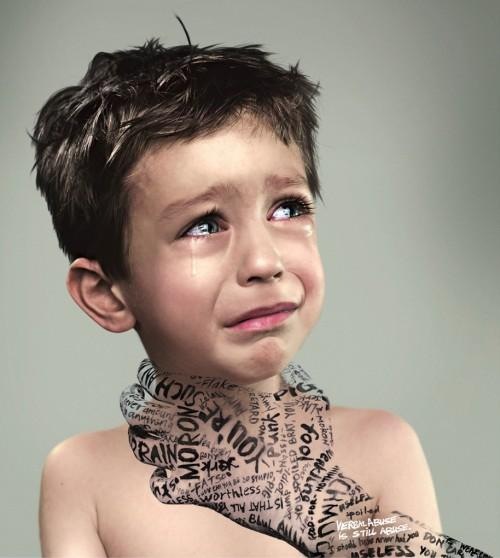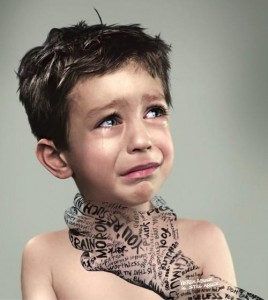Alright, to begin with, I was sitting at a coffee shop outside, enjoying a cup of coffee with a friend when all of a sudden without any warning these two kids turn the corner playing around–a small boy maybe four or five and his sister, approximately three or so years older. The boy was actually crying for some reason and then their mom follows behind practically chasing them and out of breath, which was explained by the cigarette in her hand. She grabs her son who’s crying, lifts him forcefully up in this jerking motion, and then screams word for word, “You’ve ruined my life! You’re always crying!” Right into the kid’s face. She then promptly disappears back to her car, or wherever, leaving my friend and me to scratch our collective heads and wonder what the hell was that all about. And then we laughed.
Now, I’m not saying that laughing was necessarily the right response; but if you witnessed the scene and knew how abrupt, strange, and out-of-nowhere this was, then you’d understand our response. But it did get me to think. I started thinking maybe this woman’s soul had been sucked out of her because she drank franchised coffee too often, but thought that improbable and went on to other theories. Maybe those weren’t actually her kids and she had kidnapped them at a young age; and like buyer’s remorse, no longer wanted them and was ready to discard them like a used handbag. And my mind kept going through various scenarios that just had to be fictional, but would invariably mean that the children were, in fact, in grave danger, which led me to believe that I was a horrible human being for laughing at what she said. And when I say laugh I don’t mean a few giggles and I’m done. I mean, I just busted out laughing at this kid’s neglect. And no matter what sort of conscionable realization that I arrived at in the end didn’t make up for the fact that I had not only laughed at the situation, but probably worsened the situation through my inaction. In a way, through silence, my friend and I condoned her actions.
Again, I’d be remiss to inchoately entertain that this woman was just a bad parent without exploring any other explanations to her actions and words. This is not an exercise of self-justification or even denial, but merely an acknowledgement of what it truly is like to be a parent. And while I will probably never agree with what that woman did, I cannot help to feel some imagined, perhaps, affinity for her position. I’ve known people in my life who had kids at an early age, at a time when they weren’t ready, and a lot of them imparted psychological abuse onto their child while smiling and saying, ‘I love you, Johnny,’ not truly comprehending what it means to actually have a child. Now, most of these parents vent their frustrations about parenthood usually behind their child’s back so that their kid doesn’t have to bear the torment on their little psyches, while the mother that I observed went the alternative route by screaming her odium for her children in a public venue with a lot of witnesses. To each their own I suppose. But the underlining principle—that kids annoy the crap out of adults, especially their parents—is there at the core of these two types of dislike for their children. Thus, perhaps we cannot condemn this woman entirely when, in fact many people, sometimes consciously, sometimes unconsciously engage in a parallel rhetoric to vent their frustrations towards their kids. So the vitriol that might be churning within some of you who read this, especially you parents, should not necessarily be directed at this specific person, but rather should be an internalized process that allows you contemplate and to reach a better understanding of humanity and yourselves.
As some might agree, ethics as applied to this situation, is not necessarily a black-and-white affair. Yes, we could easily condemn this woman by saying that what she did is morally reprehensible, but that lacks fundamental understanding of the circumstances that brought her to say such horrible things. And so we’re confronted with tearing her apart for ethical reason while we ourselves start to bring ourselves to that level of irrational and unethical behavior that she, i.e. the mother, so blatantly violated. What it falls down to is this faucet of antiquated mores that we as a society have this knee-jerk response to so that we can continue on with our daily lives and not have to actually acknowledge that there is perhaps a problem. For the longest time it was nigh impossible to even conceive that a mother could/would ever harm or kill her child; yet recently, we’ve become more open to questioning a parent’s, even a mother’s, actions. Postpartum depression and other such mental diseases associated with parenthood has elucidated the reality of having a child that had previously not been addressed. Yet still we have this knee-jerk responses colored in our own preconceived notions of how a ‘proper’ parent must act.
As Aristotle, that white-bearded old Greek bastard, said about virtue in his Nicomachean Ethics, “You cannot have virtue without vice.” This essentially means that impartiality, or true, absolute objectivit cannot exist within an individual without some sort of bad habit. It is how we balance what Aristotle recognized as a golden mean of sorts, the two that truly defines our lives, and ultimately determines that kind of person we are be it ethical or not. If we are to have a knee-jerk response to what this woman did, then Aristotle was wrong. Ethics would merely be a marionette acted out in global proportions. Thus, I propose this open dialogue with ethics, with Aristotle, even (to be so bold!), where we actively attempt to define and engage, hopefully for the better, how we appropriate ethics in situations that can have many different interpretations.
Parental Control,





mrmind
1 Mar 2011Unfortunately we have not developed a human GPS to point out the correct path to being a perfect parent. Most of us,that is those of us that are within the limits of good mental health, try
to use our best moral judgement to make the most suitable choices available when raising our children. However, in the case of the enraged woman who screamed in the face of her already horrified child, I can only say that she apparently has been subjected to same
treatment in her childhood or maybe she did not receive the upbringing necessary to enable her to
handle the everyday stresses of having children. The best we can do when raising our kids is to love but not
worship, punish but not abuse, guide and not mislead,
constructively criticize and not tear down, limit but not imprison, protect, reward, support the positive attributes and accomplishments of our children. Most
importantly spend time with them, that is the main ingredient which will determines your validity as a
parent. Become involved in your children’s life. Make a note
of their interests, likes and dislikes or you might wake
up one day and find out that you have khadafy living under your roof!
Pingback: Communicate effectively with your child